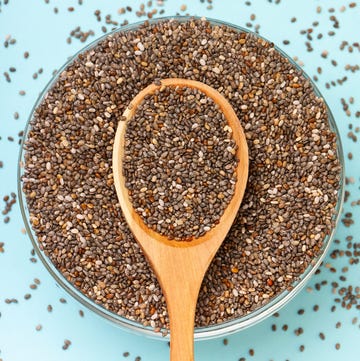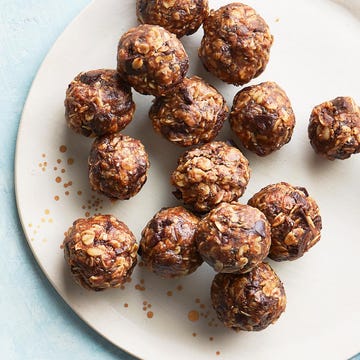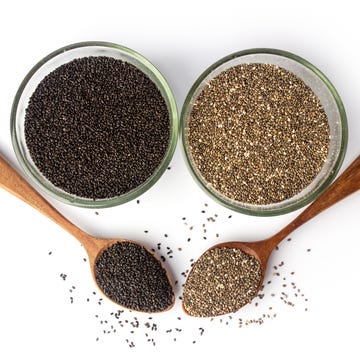By now, chia seeds are a staple in many of our diets. The itty-bitty seeds have become hugely popular over the past few years — and for good reason. They’re about as close as you can get to a nutritional superfood. Plus, they’re versatile enough to be added to virtually anything you’re whipping up in the kitchen: granola, smoothies, pudding, salad dressing, muffins and even chia water. But is it okay to eat chia seeds every single day? We asked a registered dietitian and a gastroenterologist about how safe these beloved seeds actually are.
What are chia seeds?
Chia seeds come from the chia plant, which is grown in Australia and in parts of Latin and South America. The seeds have been eaten for thousands of years (even reportedly by the Aztecs).
Chia seeds are known for their ability to absorb liquid and expand 10 to 12 times their size. That’s because they’re high in soluble fiber, which pulls in and retains water. It’s how chia seeds can thicken plant-based or dairy milk and transform it into a creamy pudding.
The fiber in chia seeds is also why they’ve become so popular, particularly on TikTok and Instagram, as a way to reduce bloating and constipation and possibly even help with weight management.
What are the health benefits of chia seeds?
Chia seeds are packed with important nutrients like those listed below. Each one serves up its own array of health benefits.
Are chia seeds safe to eat every day?
The short answer? Yes. But there’s a caveat: You have to drink plenty of water when you eat them.
“Fiber, in general, is great for you, but if you eat too much fiber, that can actually kind of cause some of the opposite symptoms you’re trying to fight, like gas and bloating,” Dr. Bass says. “Too much fiber and not enough fluids can actually cause constipation to get worse.”
The soluble fiber in chia seeds pulls in water from the digestive tract, and the seeds expand in your stomach, so you’ve got to offset that by staying hydrated. Dr. Bass recommends drinking a minimum of 64 ounces (8 cups) of water per day.
“You can eat chia seeds every day, and if you do, I wouldn’t recommend more than a tablespoon or so when using them soaked because they are so fiber-filled,” Sauceda says. If you’re eating them dry and unsoaked, she recommends only about one teaspoon.
Some health conditions, including irritable bowel syndrome and diverticulosis, could also be aggravated by chia seeds. Dr. Bass says chia seeds could also pose a problem to people who have difficulty swallowing. “They can expand in your esophagus, and that can cause some issues, but that occurs more if you're not hydrated,” he explains.
What to make with chia seeds
If you want to move beyond chia pudding and smoothies, Sauceda has some recommendations for other ways to use chia seeds:
- Energy balls or granola bars: Add just a teaspoon or so to your favorite recipe to bump up the amount of fiber, protein and healthy fats.
- Bread: Bake the seeds into bread, which you can slice and use for sandwiches or your morning avocado toast.
- Chia seed flour: “If you have a powerful enough blender, you could grind the seeds and use the resulting flour to make a variety of baked goods, like flatbread or banana bread,” Sauceda says.
- Crunchy topping: Sprinkle “raw” chia seeds on salads, yogurt, or virtually anything you want to give a little more bite and texture.
The bottom line
Yes, chia seeds are safe for most people to add to their daily menu, but the key is to drink plenty of water when you eat them. Chia seeds pack a lot of fiber, which could cause some GI upset if you consume too much at once. Take extra care if you have irritable bowel syndrome or diverticulosis, or have trouble swallowing.
Laura Iu, R.D., is a registered dietitian nutritionist, certified intuitive eating counselor, yoga guide, and owner of Laura Iu Nutrition, a private practice in New York City. She earned her Bachelor of Science in Nutrition and Dietetics from New York University and completed her internship in dietetics at Weill Cornell & Columbia Medical Center of New York-Presbyterian Hospital. She went on to work in New York City’s top hospitals, including Mount Sinai Hospital and NYU Langone Health. She believes that true health is all encompassing — physical, emotional, and mental wellbeing — not an external measure via shape or size.














